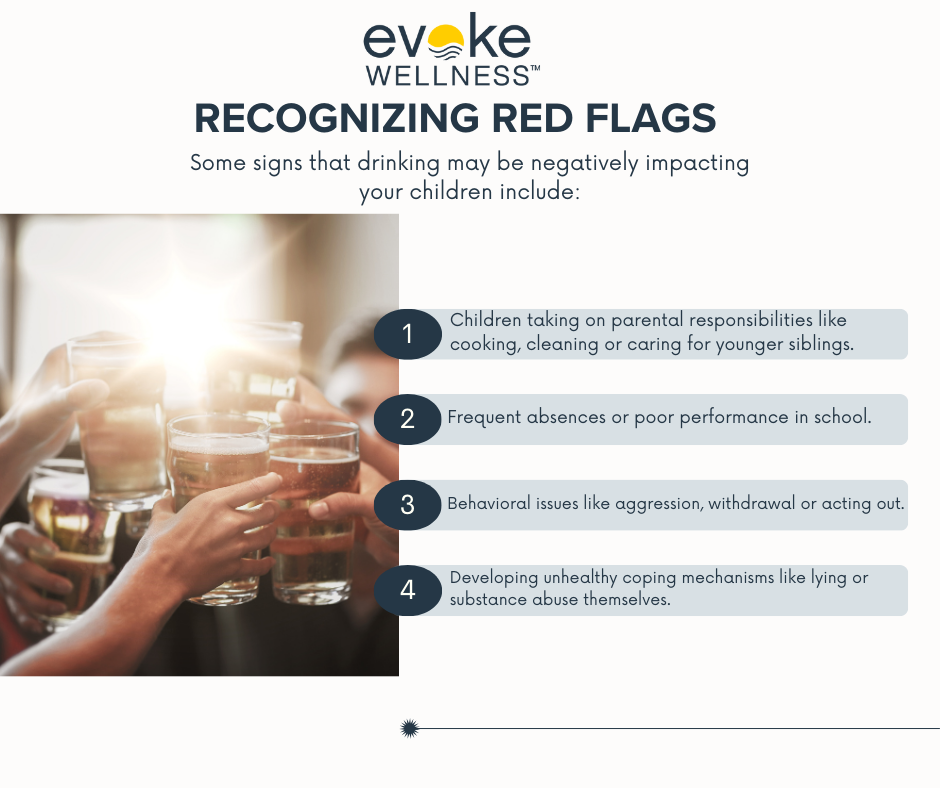As a parent, you strive to provide the best for your children. However, if you’re struggling with alcohol addiction, you may be unintentionally causing harm to those you love most. Recognizing the signs that your drinking is affecting your children is crucial for their well-being and your family’s future. This article will help you identify potential red flags and guide you towards the support you need. By understanding the impact of your behavior and taking proactive steps, you can create a healthier environment for your children and strengthen your family bonds. It’s time to confront the difficult question:
Is your drinking affecting your children?
If you or a loved one is struggling, help is available today. Call (833) 969-3318 to speak with our compassionate team, or reach out online and schedule an appointment to begin a healing journey.
How do alcoholic parents affect their children?
Emotional & Behavioral Impact
Parental alcohol abuse can significantly impact a child’s emotional and behavioral well-being. Children may experience feelings of guilt, anxiety, embarrassment, anger or depression. They often become codependent – taking on parental responsibilities prematurely. This emotional trauma manifests through behavioral issues like acting out, social withdrawal or academic difficulties.
Developmental Delays
Alcoholic parents struggle to provide a stable, nurturing environment crucial for healthy child development. Their inconsistent parenting and emotional neglect impairs the child’s cognitive abilities and social skills. The chaos and stress can also delay physical growth milestones.
Increased Risk Factors
Children of alcoholics face a higher risk of developing substance abuse issues themselves. Genetics load them with a proclivity for addictive behavior. Environmental factors like lack of parental supervision and normalization of substance use further enable the cycle. They are also more susceptible to mental health disorders like depression, anxiety and eating disorders.
Lifelong Challenges
The trauma endured during critical developmental years can leave deep psychological scars. Even as adults, children of alcoholics may grapple with intimacy issues, difficulties forming healthy relationships, and low self-esteem. Unresolved childhood wounds can lead to perpetuating dysfunctional patterns unless addressed through counseling or support groups.
While overcoming an alcoholic upbringing is undoubtedly challenging, accessing the right resources can help break the cycle. Professional treatment programs provide tools for both the addicted parent and affected child to heal and rebuild their lives.
What happens to a child when the mother drinks alcohol?
Emotional & Behavioral Issues
When a mother consumes alcohol during pregnancy, it can lead to a range of emotional and behavioral problems for the child. According to the CDC, children exposed to alcohol in the womb may experience difficulties with memory, attention, reasoning, and problem-solving skills. They are also at higher risk for developing depression, anxiety, hyperactivity, and impulsive behavior.
Mothers who continue drinking after giving birth can further exacerbate these issues. Children in this environment often struggle with insecurity, low self-esteem, and attachment disorders, making it challenging for them to form healthy relationships.
Developmental Delays
Prenatal alcohol exposure is a leading known cause of birth defects and developmental disabilities. A study from the American Academy of Pediatrics found that children with Fetal Alcohol Spectrum Disorders (FASD) may experience delays in physical growth, cognitive abilities, and motor skills development.
Even moderate levels of alcohol consumption during pregnancy can impair a child’s brain development, leading to lifelong consequences. Early intervention and specialized support services are crucial for these children to reach their full potential.
Long-Term Health Risks
Mothers who drink heavily during and after pregnancy put their children at risk for various long-term health problems. According to the National Institute on Alcohol Abuse and Alcoholism, these can include organ defects, vision or hearing problems, and an increased susceptibility to developing alcohol or drug dependencies later in life.
Additionally, children raised in households with parental alcohol abuse often experience neglect, poor nutrition, and lack of proper medical care, further compounding their health risks.
By understanding the profound impact of maternal alcohol consumption on children, mothers can make informed choices and seek support to create a nurturing environment for their child’s well-being. Evoke Wellness at Coconut Creek offers comprehensive addiction treatment programs and resources to help families overcome the challenges of substance abuse.
Is your drinking influencing your kids?
Children Notice More Than You Think
You may think you’re hiding your drinking habits well, but children are incredibly perceptive. Even if you don’t get visibly drunk around them, they’ll pick up on subtle cues – the bottles in the recycling, your mood changes, or the way you sometimes slur words. Kids are like sponges, absorbing everything around them.
Modeling Unhealthy Behaviors
When parents drink excessively, they normalize alcohol misuse for their kids. Children learn by watching the adults in their lives. If they see you frequently drinking to excess or using alcohol to cope with stress, they’ll internalize that behavior as acceptable – greatly increasing their risk of developing alcohol issues themselves.
Emotional Impacts
Alcohol abuse takes an enormous emotional toll on the whole family. Kids may feel scared, ashamed, or resentful when a parent drinks too much. They have to “grow up” faster to cope, missing out on a carefree childhood. Parental alcoholism is also a recognized form of childhood trauma that can lead to mental health issues down the road.
Setting a Better Example
If you’re concerned your drinking is negatively affecting your kids, it’s time to make changes. Explore healthier coping mechanisms and family bonding activities. Be open about getting help through counseling, support groups or treatment programs. Your commitment to sobriety will create a lasting positive impact on your children’s lives.
What is it like living with an alcoholic husband?
The Emotional Toll
Living with an alcoholic husband can be an emotionally draining and isolating experience. You may feel a constant sense of worry, anxiety, and walking on eggshells around your partner. Their unpredictable behavior, mood swings, and broken promises can take a significant toll on your mental health and self-esteem. As described on the Evoke Coconut Creek blog, you may experience emotional turmoil, financial strain, and disruption to your daily life.
Impact on Family Dynamics
Alcoholism doesn’t just affect the person struggling with addiction; it can have a devastating impact on the entire family dynamic. Children of alcoholics are 2-6 times more likely to develop alcoholism themselves, perpetuating a cycle of addiction and trauma. The constant tension and instability in the home can lead to strained relationships, trust issues, and emotional scars that can last a lifetime.
Feelings of Isolation and Shame
As the spouse of an alcoholic, you may feel isolated and ashamed, as if you’re the only one going through this ordeal. The stigma surrounding addiction can make it difficult to open up and seek support from friends and family. You may even feel powerless to help your partner, as their addiction takes control of their life and decision-making.
The Need for Support and Treatment
While living with an alcoholic husband can be an incredibly challenging and emotionally taxing experience, it’s crucial to remember that you are not alone. Treatment and support are crucial for both the alcoholic and their family. Seeking professional help, joining support groups, and building a strong network of understanding individuals can provide the resources and guidance you need to navigate this difficult situation. With proper treatment and a strong support system, recovery is possible, but it requires patience, perseverance, and a commitment to breaking the cycle of addiction.
Where to get help for alcohol addiction
Alcohol Rehab Programs at Evoke Wellness
If you or a loved one is struggling with alcohol addiction, professional help is available. Evoke Wellness at Coconut Creek offers a comprehensive alcohol rehab program designed to guide individuals through every step of the recovery process. Their evidence-based approach combines therapies like cognitive-behavioral therapy, dialectical behavior therapy, and holistic practices to address the physical, psychological, and emotional aspects of alcoholism.
Personalized Treatment Plans
At Evoke Wellness, you’ll receive a personalized treatment plan tailored to your unique needs. This may include individual and group counseling, relapse prevention strategies, stress management techniques, and medication-assisted treatment if appropriate. The program’s goal is to equip you with the tools and support needed to achieve lasting sobriety and rebuild a fulfilling life.
Continuing Care and Support
Recovery is an ongoing journey, and Evoke Wellness recognizes the importance of ongoing support. Their alumni program offers regular activities, events, and opportunities to connect with others in recovery, fostering a strong sense of community. Additionally, their team of counselors and family therapists are available to provide guidance and answer questions for both you and your loved ones throughout the process.
Start Your Recovery Today
Overcoming alcohol addiction can be challenging, but you don’t have to face it alone. Evoke Wellness at Coconut Creek offers a safe, supportive environment where you can focus on your recovery. Their admissions process is streamlined, and they can help verify your insurance coverage, making effective treatment more accessible. Take the first step towards a healthier, sober life by reaching out to Evoke Wellness today.
FAQ – Is my drinking affecting my children?
The Impact on Children
Parental alcohol abuse can have profound effects on children, both emotionally and developmentally. Children of alcoholics often experience feelings of guilt, anger, fear, and loneliness. They may struggle with low self-esteem, anxiety, and depression. Alcohol abuse disrupts family dynamics and can create an unstable, unpredictable home environment – impacting a child’s ability to form secure attachments.
If you notice these signs, it’s crucial to seek help for both yourself and your children through counseling, support groups or treatment programs.
Prioritizing Your Family
Ultimately, the decision to get sober protects your children’s emotional well-being and models healthy behaviors. Through sobriety, you can rebuild trust, open lines of communication, and create a stable environment for your family to thrive. While the impacts of alcohol abuse can linger, committing to change demonstrates your love and prioritizes your children’s needs.
Conclusion
As you reflect on your drinking habits and their potential impact on your children, remember that seeking help is a sign of strength, not weakness. By taking steps to address your alcohol use, you’re prioritizing your family’s well-being and setting a positive example for your children. Evoke Wellness at Coconut Creek offers comprehensive support and treatment options to guide you on your journey to recovery. Don’t hesitate to reach out for professional assistance – your children’s future and your own health are worth it. With the right help and determination, you can break the cycle of addiction and create a healthier, happier home environment for your family.
Begin Your Journey With Evoke Wellness at Coconut Creek
Evoke Wellness at Coconut Creek is a full-service addiction treatment facility serving Florida residents. We base each of our programs on the individual’s severity of symptoms and use a combination of evidence-based therapies and holistic approaches to address the needs and recovery goals of the patient.
If you or a loved one is struggling, help is available today. Call (833) 969-3318 to speak with our compassionate team, or reach out online and schedule an appointment to begin a healing journey.



